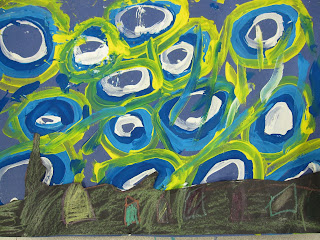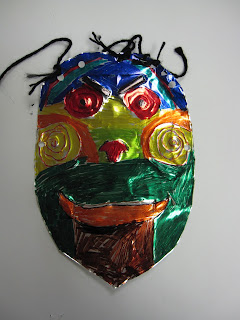Thursday, May 26, 2016
Starry Night
First grade students studied Vincent Van Gogh and compared his artwork to Georges Seurat's artwork, an artist we just finished studying. Students painted their own version of the famous "Starry Night" painting, complete with a little village in the bottom of their painting.
"Blue Dog" Prints
Third Grade students studied the artwork of George Rodrigue, an artist from New Orleans. Students learned that Rodrigue often painted a blue dog in his artwork and used that dog to comment on events happening in the United States. They watched a video clip of Rodrigue talking about his artwork and then discussed some of his artworks and what they could mean.
Students created their own version of Blue Dog and made a print in the color of their choice. They cut out their print and glued it into a background. Then students wrote about the color choice for their blue dog.
Students created their own version of Blue Dog and made a print in the color of their choice. They cut out their print and glued it into a background. Then students wrote about the color choice for their blue dog.
Cezanne inspired still life
Second grade students compared still life artwork to portraits and landscapes. They studied the artist Paul Cezanne and painted a plate of apples that was placed at their table, in the style of Cezanne. Since we just finished an art project where students learned about Claude Monet, students also compared Monet's style to Cezanne's and discussed how artists can influence each other.


Romero Britto Inspired Paintings
Kindergarten students looked at artwork by Romero Britto, a current pop-artist who lives in Miami, Florida. Students chose a simple subject and then broke that subject into different sections, and then broke up the background into different sections as well. They painted each section differently, and added patterns and repetition of lines and polka dots in some of the sections.
Tints and Shades Fruit Slice
Third Grade students drew a slice of either a lemon, lime or orange by looking at a fruit slice at their table. Then they began mixing tints and shades of the color of their fruit by adding white for tints and black for shades. They painted these tints and shades in each section of their fruit slice.

Tessellations
4th
graders looked at artwork by M.C. Escher and learned about tessellations.
Tessellations are shapes that can fit together with any overlaps or gaps,
across a plane. First, they created a shape that would tessellate. Then they
traced this shape until it covered their paper. Finally, they brainstormed what
they thought their shape looked like and drew those details into each shape.
Then they colored their tessellations.
Wednesday, May 11, 2016
Laurel Burch Inspired Cat Sculptures
Second grade students were introduced to the artwork of Laurel Burch. She loved to create artwork about cats, and many of her paintings have been reproduced on fabric to create bags and clothing. Laurel Burch had a very hard life, but you would never know it from her artwork because her art is very whimsical and fun. Much of her artwork features pattern and repetition. Students created cat sculptures from toilet paper rolls and other scraps of cardboard. They used bright colors, pattern and repetition of shapes and colors, much like Laurel Burch did in her artwork.


Monet's Pond
Second grade
students studied Claude Monet, a French Impressionist who lived 100 years ago.
He was one of the first artists to think of painting outside. He loved to paint
nature so much that he moved to the country to paint. He is famous for painting
the water lilies that grew in the pond behind his house. Students discussed his
water lily paintings and used tempera paints to paint their own pond, with
painterly brushstrokes, just like Monet.

Metal Tooling Masks
5th Graders learned
about the art of repousse, also known as metal tooling. Students designed
symmetrical masks and embossed them on to pieces of metal. They colored them
with permanent markers and used beads, twine and raffia for embellishment.
Students discussed the purpose of masks around the world. Many of their masks
were inspired by masks from Africa .


Subscribe to:
Comments (Atom)
















